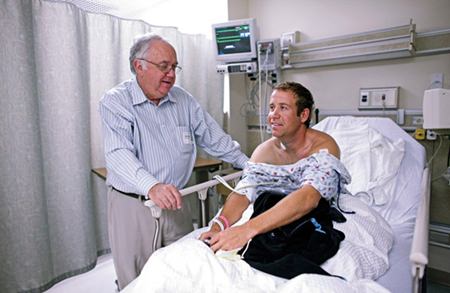He is 34 years old, 5’8″ tall, weighs 11 stone and plays on the PGA Tour. Last week, at the Zurich Classic of New Orleans, he finished with a 14-under total of 274 and a share of fifth place – one shot in front of Englishman and current US Open Champion, Justin Rose. His name is Erik Compton and he is on his third heart.
Compton was nine when he was diagnosed with viral cardiomyopathy, a condition where the heart muscle is inflamed and unable to pump as hard as it should. A few years later, when he was 12, a young lady named Jannine was killed when the car she was travelling in was hit from behind. Compton was given her heart.
 Erik Compton with father, Peter, in August 2008, three months after the second transplant.
Erik Compton with father, Peter, in August 2008, three months after the second transplant.
Some 15 years later, and playing on the second-tier Nationwide Tour, Compton was home early after missing the cut. He was out driving when his heart started to expire. Knowing what was happening, he drove straight to the hospital. “My heart was working at about 20 percent of normal at that point,” Compton says. “The question was whether they would be able to find a donor before it shut down completely.”
In May 2008, some eight months after he drove into that hospital, a 26-year-old volleyball player died when his motorcycle was hit from behind by a hit-and-run driver. His name was Isaac Klosterman, and he became Compton’s second heart donor.
After graduating from university, Compton turned professional in 2001. During the next ten years he played on secondary tours such as the Nationwide Tour, the Canadian Tour and the NGA Hooters Tour. Through sponsor exemptions and local qualifying, he managed some 30 PGA Tour events, making the cut 18 times. He finally obtained a PGA Tour card in 2012, but failed to retain it by finishing 163 on the money-list. He then finished T-7 at qualifying school to earn his tour card for 2013, a status he retains today.
Erik Compton’s life as a professional golfer is somewhat different to that of the average touring pro. He can’t do more than three tournaments in a row without becoming exhausted. His fitness levels are a day-to-day affair. He has no idea how he will feel, energy-wise, prior to walking on to the tee at the start of each round. “If I withdrew from every golf tournament I play in when not feeling well, I wouldn’t finish half of them,” he says. “That’s why I always give it a shot because sometimes I do start to feel better after a few holes. Some days it gets worse.”
It was to be the latter when he agreed to meet Anna King. Anna, aged 13, was waiting to undergo a heart transplant. Compton was approached, as he often is, to talk with Anna and tell her what to expect. “She was in exactly the place I was in when I was 12,” he says. “I like to talk to people when I can in that situation because I want them to understand where they are going. It’s a very scary time, but I can tell them first-hand that they are going to be OK.”
The plan was for Anna to watch Compton play the first round in the Shell Houston Open, then to sit and chat about her upcoming event. As he warmed up, he had that feeling he had experienced many times before; he was too sick to play.
“On any other day I would have WD’d on the spot, but I couldn’t do it,” he said. “I had to finish. I didn’t want Anna to see how badly I felt. I’m where she wants to go. I didn’t want that thought to scare her.”
He finished the round shooting 80. Anna King’s Facebook page shows a photo of her with Compton taken soon after his round. He has his arm around her, grinning as if he couldn’t be feeling better. “My head,” he said, “felt like it was about to explode.”
Compton met his wife, Barbara, whilst waiting for his second heart transplant. They married in 2008 and had their first child, Petra, a year later. As Barbara shares her vision of the future, she admits, “There are times when I think about it. Nothing is guaranteed for any of us day-to-day. But Erik has a different history than most people. I want him to see Petra get married. I want him around a long time. For now, though, we just enjoy our life. That’s all we can do.”
Compton’s philosophy is similar. “When I had my first transplant, my father said, ‘You can look at yourself as a victim, or you can look at yourself as lucky.’ I’ve always tried to remember that.”
Australian golfer Jason Day met Compton when playing on the Nationwide Tour. They became friends. Day is one of the few who really knows just how hard it is for Compton to play well enough to keep his card.
“The guy starts the day in pain every single morning,” says Day. “He doesn’t like to talk about it, but there are days out there when you can see the hurt in his face. Most of us out here get pissy when we have a runny nose, yet I’ve never heard him complain. Sometimes I think about what he’s been through and I realise it’s amazing that he’s alive. To play on the PGA Tour is extremely difficult even if you’re in perfect health. But when he’s on the golf course, he oozes confidence. It’s as if he becomes a different guy.”
Erik Compton’s performance in finishing T5 in last week’s PGA Tour event may not raise many eyebrows, but it should. Would he ever win one, the celebrations would be wondrous.
Golfnutter



